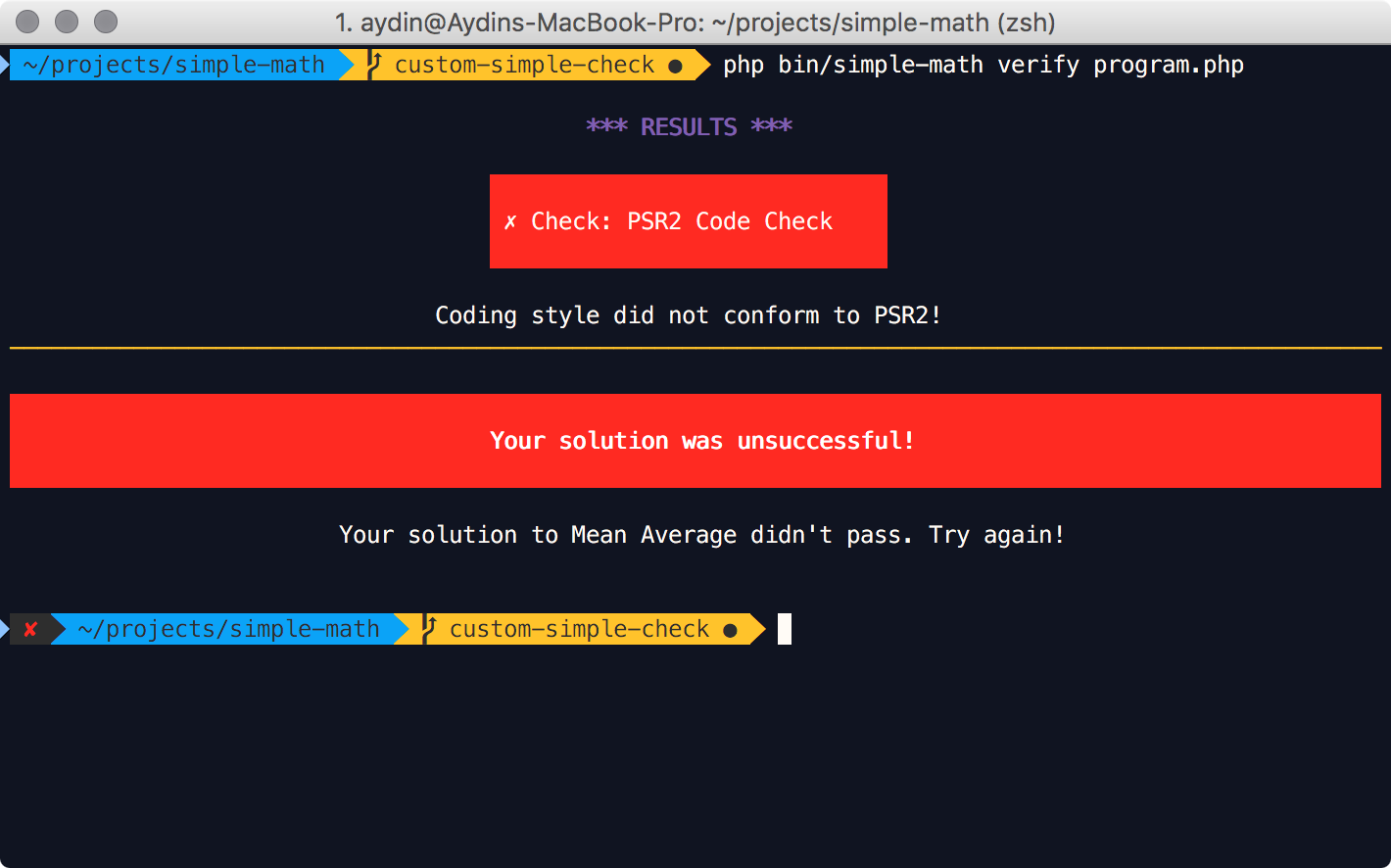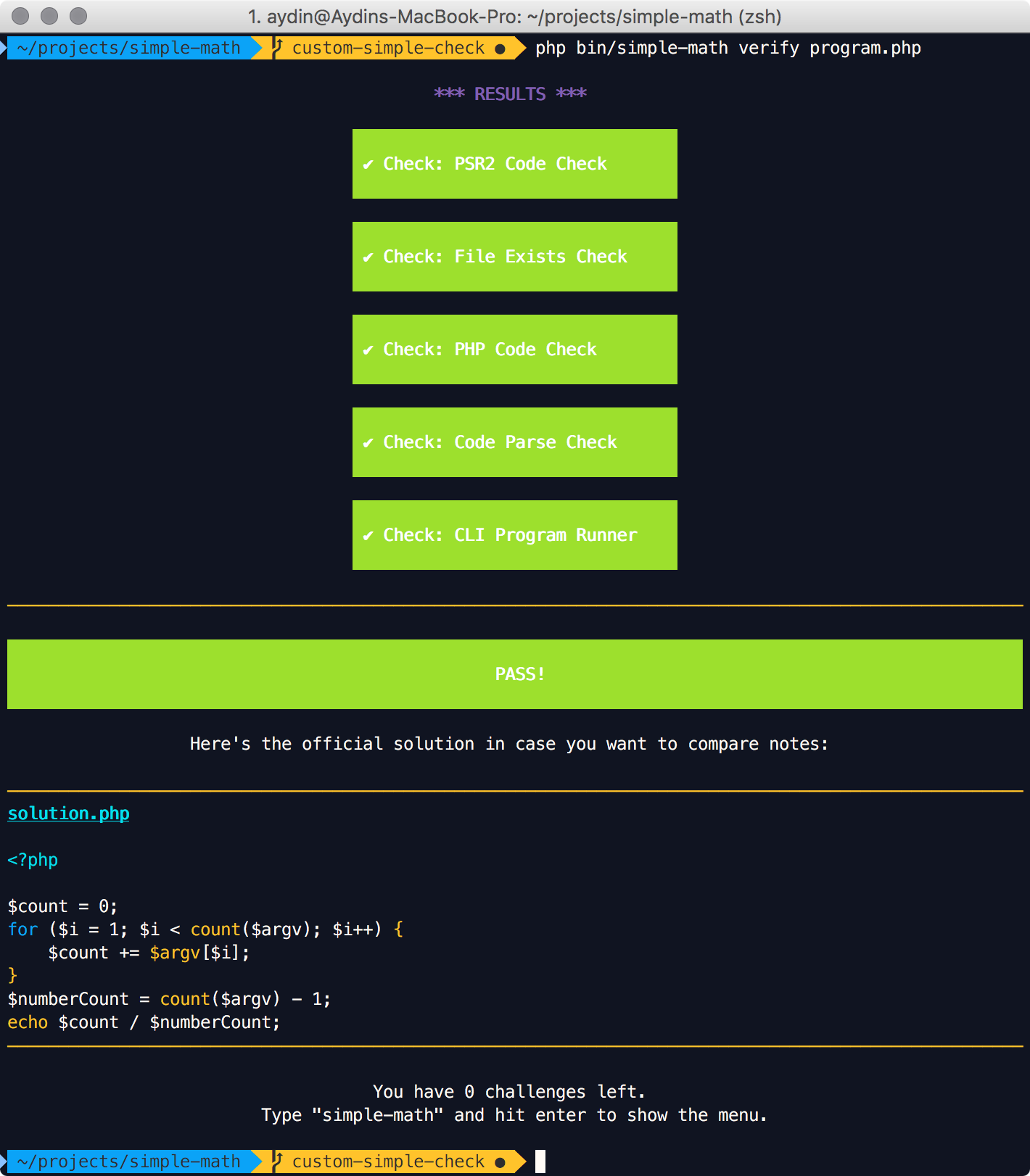Open Menu
Documentation Home
Workshop Tutorial
- Workshop Tutorial
- Creating your own workshop
- Modifying the theme of your workshop
- Creating an exercise
Reference Documentation
- Reference Documentation
- The Container
- Available Services
- Exercise Types
- Exercise Solutions
- Results & Renderers
- Exercise Checks
- Bundled Checks
- Creating Simple Checks
- Creating Custom Results
- Creating Custom Result Renderers
- Events
- Creating Listener Checks
- Self Checking Exercises
- Exercise Events
- Patching Exercise Submissions
Creating Simple Checks#^ TOP
In this article we will learn how to create a simple check. If you don't fully understand what checks are, head over to the Exercise Checks article.
We will build a fairly boring check which verifies that a student's solution passes the PSR2 coding standard. Lets get started!
Creating a check begins with creating a file and a class for our check . We need to implement the interface
PhpSchool\PhpWorkshop\Check\SimpleCheckInterface which extends from
PhpSchool\PhpWorkshop\Check\CheckInterface. Let's breakdown these methods before we start coding:
getName()
This method should just return a string which represents the name of the check. This will be printed on
the terminal during the verification process. This will be PSR2 Code Check for our check.
getExerciseInterface()
This method should just return a string which is the FQCN (Fully Qualified Class Name) of the interface
that the exercise needs to implement when requiring our check. Because we don't need any extra information for our
check we can just use PhpSchool\PhpWorkshop\Exercise\ExerciseInterface.
canRun(ExerciseType $exerciseType)
This method receives an ExerciseType instance which represents the type of exercise, we use this to
inform the workshop which exercise types our check works with: CLI, CGI or CUSTOM. We will support CLI & CGI.
check(ExerciseInterface $exercise, Input $input)
This is the method where we actually perform our check logic, executing PHP_CodeSniffer. This method receives an instance of the current exercise and the input arguments passed to our workshop, which will contain the file name of the student's solution.
This method needs to return an instance of PhpSchool\PhpWorkshop\Result\ResultInterface. Depending on
whether you want a success or failure to be recorded it will be an instance of
PhpSchool\PhpWorkshop\Result\SuccessInterface or
PhpSchool\PhpWorkshop\Result\FailureInterface. Learn about results
here.
getPosition()
This method should return one of two constants
PhpSchool\PhpWorkshop\Check\SimpleCheckInterface::CHECK_BEFORE,
PhpSchool\PhpWorkshop\Check\SimpleCheckInterface::CHECK_AFTER. This value indicates when the check
should be run.
The process of verifying a student's solution looks something like the following (pseudo code):
//run before checks
foreach ($beforeChecks as $check) {
$result = $check->check($exercise, $submissionFilePath);
if (!$result->isSuccessful()) {
return;
}
}
//compare output of student solution and reference solution
$this->verifier->compareOutput($exercise);
foreach ($afterChecks as $check) {
$result = $check->check($exercise, $submissionFilePath);
//store result
}
Before Verifying
When a check uses CHECK_BEFORE mode it is run before the output verification. The process is
also short circuited if a check returns a failure. No more checks will be run and the output will
not be compared.
After Verifying
When a check use CHECK_AFTER mode it is run after the output verification. This means that
the check is run after the student's solution has been run. After checks are useful for verifying that something
was actually performed in the students submission, for example, inserting a row into the database.
Build the check#^ TOP
Now - let's build it! We will use the already built tutorial workshop as a base - the finished code is
available on the custom-simple-check branch of the
tutorial repository. We will start fresh from the
master branch for this tutorial, so if you haven't already got it, git
clone it and install the dependencies:
cd projects
git clone git@github.com:php-school/simple-math.git
cd simple-math
composer install
Our check will run the PHP_CodeSniffer tool against the student's submission and report a success or failure based on the result.
1. Require the PHP_CodeSniffer tool as a dependency
composer require squizlabs/php_codesniffer
2. Create the folder and class
mkdir src/Check
touch src/Check/Psr2Check.php
3. Write the class
<?php
namespace PhpSchool\SimpleMath\Check;
use PhpSchool\PhpWorkshop\Check\SimpleCheckInterface;
use PhpSchool\PhpWorkshop\Exercise\ExerciseInterface;
use PhpSchool\PhpWorkshop\Exercise\ExerciseType;
use PhpSchool\PhpWorkshop\Result\Failure;
use PhpSchool\PhpWorkshop\Result\Success;
use PhpSchool\PhpWorkshop\Input\Input;
class Psr2Check implements SimpleCheckInterface
{
public function getName()
{
return 'PSR2 Code Check';
}
public function getExerciseInterface()
{
return ExerciseInterface::class;
}
public function canRun(ExerciseType $exerciseType)
{
return in_array($exerciseType->getValue(), [ExerciseType::CGI, ExerciseType::CLI]);
}
public function check(ExerciseInterface $exercise, Input $input)
{
$phpCsBinary = __DIR__ . '/../../vendor/bin/phpcs';
$cmd = sprintf('%s %s --standard=PSR2', $phpCsBinary, $input->getArgument('program'));
exec($cmd, $output, $exitCode);
if ($exitCode === 0) {
return new Success($this->getName());
}
return new Failure($this->getName(), 'Coding style did not conform to PSR2!');
}
public function getPosition()
{
return static::CHECK_BEFORE;
}
}
If the phpcs binary returns a non-zero exit code - a failure occurred: probably the solution did not
pass the coding standard check. So we return a failure with an error message. Otherwise a Success is returned.
As we brought in the tool via Composer, we can rest assured that the binary phpcs
is available in our projects vendor directory.
4. Register the Check and add a factory
Now you need to tell the application about your new check. We need to register a factory.
What's a factory? Open up app/config.php and add an entry for
your check. The resulting file should look like:
<?php
use function DI\factory;
use function DI\object;
use Interop\Container\ContainerInterface;
use PhpSchool\SimpleMath\Check\Psr2Check;
use PhpSchool\SimpleMath\Exercise\Mean;
use Symfony\Component\Filesystem\Filesystem;
return [
//Define your exercise factories here
Mean::class => object(),
//my checks
Psr2Check::class => object(),
];
Note the new entry for Psr2Check::class => object(),. Finally, we need to tell the application about our
check in app/bootstrap.php. After the application object is created you just call addCheck
with the name of check class. Your final app/bootstrap.php file should look something like:
<?php
ini_set('display_errors', 1);
date_default_timezone_set('Europe/London');
switch (true) {
case (file_exists(__DIR__ . '/../vendor/autoload.php')):
// Installed standalone
require __DIR__ . '/../vendor/autoload.php';
break;
case (file_exists(__DIR__ . '/../../../autoload.php')):
// Installed as a Composer dependency
require __DIR__ . '/../../../autoload.php';
break;
case (file_exists('vendor/autoload.php')):
// As a Composer dependency, relative to CWD
require 'vendor/autoload.php';
break;
default:
throw new RuntimeException('Unable to locate Composer autoloader; please run "composer install".');
}
use PhpSchool\PhpWorkshop\Application;
use PhpSchool\SimpleMath\Check\Psr2Check;
use PhpSchool\SimpleMath\Exercise\Mean;
$app = new Application('Simple Math', __DIR__ . '/config.php');
$app->addExercise(Mean::class);
$app->addCheck(Psr2Check::class);
$art =<<<ART
∞ ÷ ∑ ×
PHP SCHOOL
SIMPLE MATH
ART;
$app->setLogo($art);
$app->setFgColour('red');
$app->setBgColour('black');
return $app;
5. Require the check in an exercise
Open up the Mean Average exercise file: src/Exercise/Mean.php and add in the following method, take care to import the
necessary classes (PhpSchool\PhpWorkshop\ExerciseDispatcher &
PhpSchool\SimpleMath\Check\Psr2Check):
public function configure(ExerciseDispatcher $dispatcher)
{
$dispatcher->requireCheck(Psr2Check::class);
}
Hopefully you will remember this from the previous section - we are just telling the exercise to use our custom check!
Try it out!#^ TOP
Run the workshop and select the Mean Average exercise. Verifying a solution which does not pass the
PSR2 coding standard will yield
the output:

And a solution which does pass will yield the output:

Custom Interface#^ TOP
When you build checks, sometimes you need extra information from the exercise to configure the check. For
example, the FunctionRequirementsCheck check
calls getRequiredFunctions() & getBannedFunctions() on the exercise, these methods are defined
on the extra interface FunctionRequirementsExerciseCheck which the exercise must implement if it requires the
FunctionRequirementsCheck check.
Maybe we want to make the standard for our check configurable - it could be PSR1, PSR2,
PEAR or any of the other
standards PHP_CodeSniffer supports. We will make this configuration available through the method getStandard().
1. Define our interface
We need an interface to define our required method. Let's do that first:
mkdir src/ExerciseCheck
touch src/ExerciseCheck/Psr2ExerciseCheck.php
Now would probably be a good idea to change our check name to something a little less specific, but we'll leave that
up to you, probably PhpCsCheck might be a little better. Okay, lets define our interface. We want the one
method getStandard to return a string representing one of the
available standards:
<?php
namespace PhpSchool\SimpleMath\ExerciseCheck;
interface Psr2ExerciseCheck
{
/**
* @return string
*/
public function getStandard();
}
2. Update our check
We need to update the getExerciseInterface() method in our check to return the name of our new
interface. Open up src/Check/Psr2Check.php and change the getExerciseInterface() method to
match below:
public function getExerciseInterface()
{
return Psr2ExerciseCheck::class;
}
We also need to modify our check() method to actually use this data:
public function check(ExerciseInterface $exercise, $fileName)
{
if (!$exercise instanceof Psr2ExerciseCheck) {
throw new \InvalidArgumentException;
}
$standard = $exercise->getStandard();
if (!in_array($standard, ['PSR1', 'PSR2', 'PEAR'])) {
throw new \InvalidArgumentException('Standard is not supported');
}
$phpCsBinary = __DIR__ . '/../../vendor/bin/phpcs';
$cmd = sprintf('%s %s --standard=%s', $phpCsBinary, $input->getArgument('program'), $standard);
exec($cmd, $output, $exitCode);
if ($exitCode === 0) {
return new Success($this->getName());
}
return new Failure($this->getName(), 'Coding style did not conform to PSR2!');
}
We've added a couple of things here - we make sure the exercise actually implements our required interface, if not
we throw an exception. We check if the standard provided is in a small subset of supported standards, and finally,
we pass the standard along to the phpcs command.
3. Update our exercise
Now we have to implement the new interface and methods in our exercise, for our Mean Average exercise, we will
still require PSR2 as the coding standard. The final exercise should look similar to below:
<?php
namespace PhpSchool\SimpleMath\Exercise;
use PhpSchool\PhpWorkshop\Exercise\AbstractExercise;
use PhpSchool\PhpWorkshop\Exercise\CliExercise;
use PhpSchool\PhpWorkshop\Exercise\ExerciseInterface;
use PhpSchool\PhpWorkshop\Exercise\ExerciseType;
use PhpSchool\PhpWorkshop\ExerciseDispatcher;
use PhpSchool\SimpleMath\Check\Psr2Check;
use PhpSchool\SimpleMath\ExerciseCheck\Psr2ExerciseCheck;
class Mean extends AbstractExercise implements
ExerciseInterface,
CliExercise,
Psr2ExerciseCheck
{
/**
* @return string
*/
public function getName()
{
return 'Mean Average';
}
/**
* @return string
*/
public function getDescription()
{
return 'Simple Math';
}
/**
* @return array
*/
public function getArgs()
{
$numArgs = rand(0, 10);
$args = [];
for ($i = 0; $i < $numArgs; $i ++) {
$args[] = rand(0, 100);
}
return $args;
}
/**
* @return ExerciseType
*/
public function getType()
{
return ExerciseType::CLI();
}
public function configure(ExerciseDispatcher $dispatcher)
{
$dispatcher->requireCheck(Psr2Check::class);
}
/**
* @return string
*/
public function getStandard()
{
return 'PSR2';
}
}You should be able to run it just the same as before we added the extra interface. You can now easily update your exercise to use a different coding standard without modifying the check.
Maybe you could try updating the check to take into account the standard when returning the
result? It currently has PSR2 hardcoded in the message!
You can see the finished, working code on the custom-interface-check branch of the
tutorial repository.